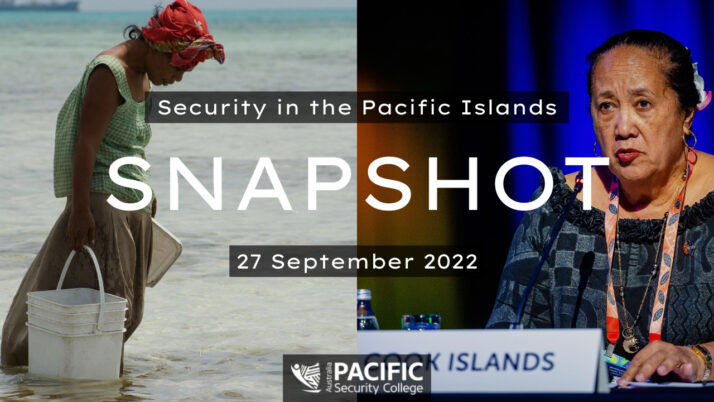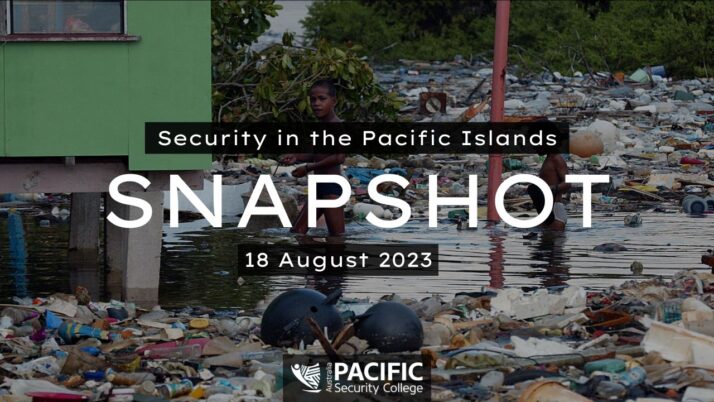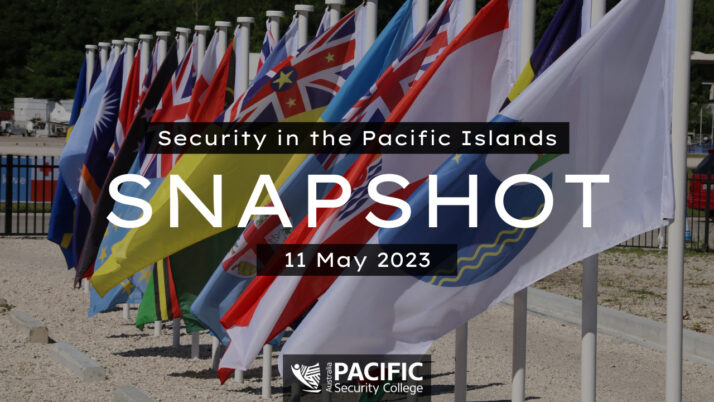Pacific Security Snapshot: 27 September 2022

The security stories shaping the region
Environmental disasters are dominating Pacific security concerns and some of the last of the region’s COVID-19 restrictions have been eased.
The Inaugural Pacific Disaster Risk Reduction Ministers Meeting (PDRRMM), hosted by the Fiji Government in Nadi on 16 September, concluded with the establishment of a regional Humanitarian Assistance and Disaster Relief Facility. The facility, to be based at Blackrock Camp in Fiji, will act as a logistics headquarter, medical centre, and relief item and equipment warehouse.
The PDRRMM focused on the importance of a collective voice from ministers across the Pacific and working towards the full implementation of the Boe Declaration Action Plan, as well as the 2050 Blue Pacific Strategy.
The meeting also allowed Pacific policymakers to come together prior to the Asia Pacific Conference on Disaster Risk Reduction (APMCDRR), the theme of which was ‘From Crisis to Resilience’, as it focused on the implementation of the 2015-2030 Sendai Framework for Disaster Risk Reduction.
Siosinamale Lui from the Pacific Regional Environment Programme spoke about the importance of lessons from the conference being integrated into ‘community based early warning systems.’ Core areas of attention from the conference included improving preparedness, building shock-proofed infrastructure, and supporting resilient communities.
In Papua New Guinea (PNG), the death toll from the 7.6 magnitude earthquake on Sunday 11 September is at least 10 people. Opposition leader Joseh Lelang criticised the absence of a warning system and the ‘ineffective’, reactive nature of the government’s current risk management system.
Meanwhile, violence has broken out in the country’s Eastern Highlands following the alleged murder of PNG Ports Chief Executive Officer Fego Kiniafa. It’s been reported that some people from Mr Kiniafa’s village have ‘wiped out’ Nagamiufa village in retaliation, displacing 400 women and girls.
Kiribati’s drought crisis is expected to continue until at least April 2023. As the prolonged drought raises fears of health risks arising from malnutrition and illness, former President Anote Tong has reflected on the combined threat of rising sea levels. Tong drew attention to an Intergovernmental Panel on Climate Change report that indicated Kiribati ‘could not be habitable beyond 2060’, as key emitting nations fail to act on climate change.
While Pacific nations are coming together to respond to environmental disasters, there is division over environmental protection concerns surrounding deep-sea mining in the Pacific Ocean.
The International Seabed Authority (ISA), an organisation established by the United Nations, has granted permission for Nauru Ocean Resources Inc to extract up to 3,600 tonnes of metal-rich nodules used in green technology such as electric vehicles. Concerns have been raised that the process could release chemical contaminants and sediment plumes that harm ocean health, and opposition from Palau, Samoa, Fiji, and the Federated States of Micronesia has been ignored.
In recent COVID-19 developments, New Zealand has discarded its COVID-19 Protection Framework, the State of Health Disaster in Marshall Islands has expired, and Cook Islands and Vanuatu have scrapped vaccination and testing requirements for entry.
Tuvalu signed a joint communique with Taiwan at the conclusion of Prime Minister Kausea Natano’s visit to Taipei earlier in September. The communique reiterates the two nations’ cooperation regarding policing, climate change and intelligence sharing. The visit also resulted in a memorandum of understanding for the establishment of an Oceanic Science and Engineering Centre, as part of a mutual commitment to ensure the survival of Tuvalu.
New Caledonia’s pro and anti-independence parties will meet with the French Government in Paris in October. The pro-independence Kanak and Socialist National Liberation Front (FLNKS), who boycotted the third and final referendum vote and refused to take part in talks, has now agreed to attend.
Campaigning for the Vanuatu snap election is underway. The state’s Malvatu Mauri, or Council of Chiefs, are running candidates for the first time on a platform for restoring the nation’s ‘principles’ and reducing the political influence of China. Voters will go to the polls on 13 October.
Finally, for the 11 Commonwealth Nations of the Pacific, the death of Queen Elizabeth II signifies the start of a new era as King Charles III becomes the new head of the Commonwealth and for some, their head of state. Various representatives and governors-general from the region flew to London to attend the funeral of the late Queen on 19 September. For states such as PNG and Cook Islands, Queen Elizabeth II had been their only head of state since independence.
Accurate as of 11:59 Thursday 22nd September 2022.
This piece was first published on Policy Forum.
More Stories

Security Snapshot - 18 Aug 2023
Pacific Security Snapshot | 18 August 2023
The security stories shaping the region ➣ Pacific Resilience Facility endorsed at the Forum Economic Ministers Meeting ➣ The Pacific Climate Security Assessment Guide ➣ French President Macron visits Papua New Guinea and Vanuatu ➣ US Secretary of State and Secretary of Defence in the Pacific ➣ Bougainville eruption leaves 8,000 displaced Climate Security Ministers…

Security Snapshot - 11 May 2023
Pacific Security Snapshot | 11 May 2023
The security stories shaping the region ➣ Australia announces Pacific support package ➣ United States President Joe Biden to visit the Pacific ➣ Embassy of the United States opens in Tonga ➣ Chinese Special Envoy for the Pacific visits Samoa ➣ 14th Pacific Heads of Health meeting in Fiji ➣ Violence in Papua New Guinea’s Porgera…






